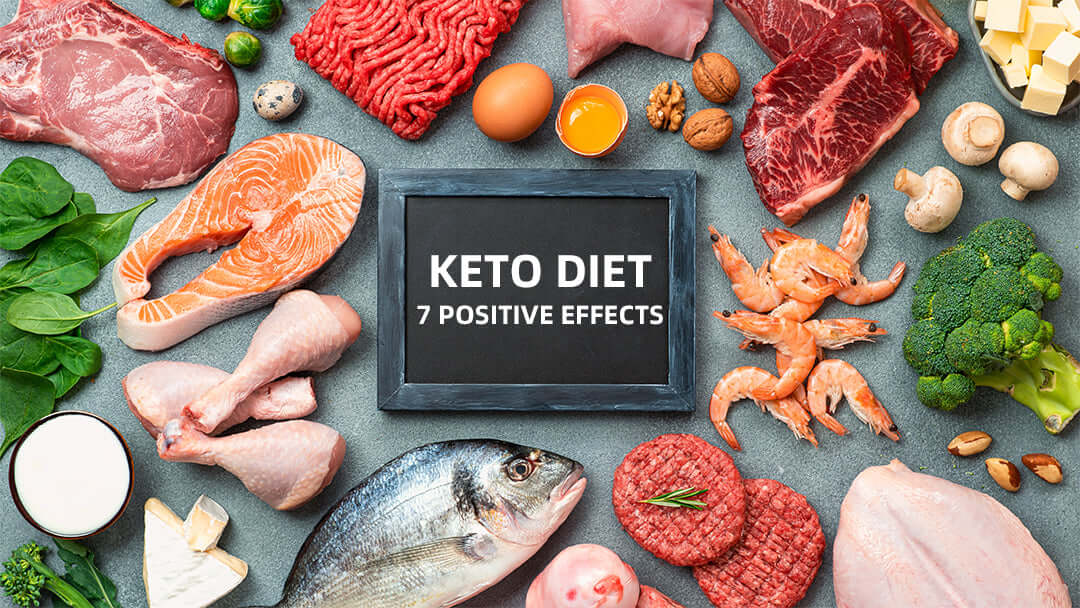In the ever-evolving landscape of nutrition, the ketogenic diet has garnered attention for its transformative effects on health and well-being. One key aspect of this diet involves cutting carbs, triggering a metabolic shift with numerous positive outcomes. In this blog, we'll explore seven compelling effects that make a ketogenic lifestyle worth considering.
1. Efficient Weight Loss:
One of the primary reasons individuals adopt a ketogenic diet is its remarkable impact on weight loss. By significantly reducing carbohydrate intake, the body enters a state of ketosis, where it burns stored fat for energy. This metabolic switch can lead to rapid and sustained keto weight loss, making it an attractive option for those looking to shed excess pounds.
2. Stabilized Blood Sugar Levels:
Cutting carbs in a ketogenic diet helps regulate blood sugar levels, providing relief for individuals with insulin resistance or type 2 diabetes. With fewer carbohydrates to convert into glucose, the body experiences fewer spikes and crashes in blood sugar, contributing to improved overall glucose control.
Enhanced Mental Clarity:
Many individuals report heightened mental clarity and improved cognitive function when following a ketogenic diet. The brain, which typically relies on glucose for energy, adapts well to using ketones, resulting in sustained focus and mental sharpness. This effect is particularly beneficial for those seeking improved productivity and concentration.
4. Increased Energy Levels:
Contrary to common misconceptions about low-carb diets, a ketogenic lifestyle can lead to increased energy levels. As the body becomes adept at utilizing fat for fuel, individuals often experience more consistent and sustained energy throughout the day, reducing the reliance on frequent snacks or carb-heavy meals.
5. Appetite Suppression:
Cutting carbs on a ketogenic diet has been linked to reduced feelings of hunger and increased satiety. The higher intake of fats and proteins can help control appetite hormones, making it easier for individuals to adhere to their dietary goals and consume fewer overall calories without feeling deprived.
6. Improved Lipid Profile:
Contrary to concerns about high-fat diets, a well-formulated ketogenic diet has been shown to improve lipid profiles. Many people experience an increase in high-density lipoprotein (HDL) cholesterol, often referred to as the "good" cholesterol, and a decrease in triglycerides, contributing to a healthier cardiovascular profile.
7. Inflammation Reduction:
A keto eating pattern cuts down highly-processed refined carbs and sugars that promote a chronic inflammatory state in the body. By contrast, ketogenic whole foods are rich in beneficial fatty acids and fiber that reduce systemic inflammation. Lowered inflammation has implications for conditions ranging from acne to arthritis.
Risks of a Keto Diet
While the positive effects of a ketogenic diet are compelling, it's crucial to be aware of potential risks and challenges associated with this eating plan.
1. Nutrient Deficiency:
Restricting certain food groups, especially fruits and whole grains, may lead to a deficiency in essential nutrients like fiber, vitamins, and minerals. It's essential to carefully plan meals or consider supplementation to ensure adequate nutrient intake.
2. Keto Flu:
Some individuals may experience the "keto flu" during the initial transition phase. Symptoms may include fatigue, headache, and nausea as the body adjusts to using ketones for energy. Staying well-hydrated and ensuring sufficient electrolyte intake can help alleviate these symptoms.
3. Gastrointestinal Issues:
A sudden increase in dietary fat can cause digestive discomfort for some people. Common issues include constipation or diarrhea. Gradual adaptation and incorporating fiber-rich foods can help manage these challenges.
Pro Tip: Mindful Eating and Continuous Ketone Monitoring
Practice mindful eating by paying attention to your body's hunger and fullness cues while using ketone monitoring tools for real-time insights into your metabolic state. The SiBio KS1 Continuous Ketone Monitoring (CKM) System witness your body's response with 24/7 uninterrupted ketone level tracking over 14 days. SiBio KS1 CKM is waterproof, sweatproof, and eliminates the need for fingersticks. Elevate your keto experience by pairing mindful choices with the precision of SiBio KS1 Ketone Monitor, ensuring a personalized and effective fat-burning journey.
Conclusion:
In conclusion, while a ketogenic diet offers numerous positive effects, it's essential to approach it with awareness and caution. With some patience during transition, followers commonly enjoy reduced appetite, steadier energy, better brain health and disease protection—all while achieving a lean physique. For sustainable wellness from the inside out, consider making low-carb, high-fat keto nutrition a lifestyle.
FAQs:
Q: Who needs keto diet?
A: Those seeking to lose weight, lower disease risk, manage blood sugar or chronic conditions may benefit. Athletes looking to enhance performance and bodybuilders aiming to strip away fat can use keto strategically. It's also an option under a doctor's guidance for conditions like epilepsy or cancer treatment support.
Q: What are the long-term health benefits of keto?
A: Potential long-term benefits include reduced risk of heart disease, diabetes, cancer and neurological diseases like Alzheimer's. It may also help manage symptoms of PCOS, epilepsy and metabolic syndrome. Keto supports weight maintenance and can improve cognition, energy levels, mood and inflammation over time.
Q: When should I stop keto?
A: According to experts, it's generally safe to stay in ketosis for up to 6 months. However, people on a long-term ketogenic diet should be monitored to avoid any potential health risks (such as kidney and cardiovascular damage).











